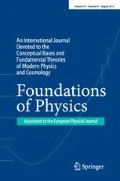The contributions to this special issue address the interplay between foundations of physics and philosophy of physics, as well as specific conceptual issues that arise at that interface. The editors’ motivation to bring these papers together in a single issue was the conviction that foundations of physics characteristically lie very close to philosophy of physics—the latter being understood in the classical, analytic tradition. These two disciplines are in fact so intertwined that separating them is frequently impossible. The differences between them are often just differences in the degree of emphasis on perspectives, with philosophy of physics typically taking a broader and more reflective view of conceptual issues in the foundations.
More generally, one can argue that physics and philosophy have always influenced each other: This point is made very clearly and convincingly in the paper by Carlo Rovelli. Rovelli argues, citing ample historical evidence, that philosophy has overall played a major positive role in the advancement of physics and that it can and should continue to play such a role in contemporary physics research. At the same time, he argues that certain philosophies of science have had negative consequences. In particular, Rovelli diagnoses philosophical errors behind two phenomena in certain current research in theoretical physics that he finds problematic: the disregard of past knowledge and the uncritically appreciative attitude towards any idea that is novel. Not everything that is novel is worthy of pursuit and Nature repeatedly rebuffed free speculations in physics, as he points out. Rovelli’s recommendation: humility in philosophical attitude.
Another very philosophical paper, which addresses an issue highly relevant for foundations of physics, is the paper by Richard Dawid. Based in part on his earlier work, Dawid’s main claim is that in today’s theoretical physics one has to rely on non-empirical methods of theory assessment, simply because empirical tests are not available for certain physical theories created by scientists, and such empirical evidence might not be available for extended periods of time. In his view such non-empirical theory assessments are possible and can be based on meta-level observations about the research process. One such observation is that, given a theory to be confirmed, the available alternatives are so limited that the theory in question is the only viable option. This idea amounts to a radical limitation to the usual concept of under determination of theories by empirical evidence. Dawid’s paper provides an analysis of the effect of such limitations in terms of Bayesian confirmation theory and argues that the science community’s trust in the viability of a theory rests on a subtle interplay between the usual empirical and the non-empirical theory assessments. Dawid’s argument in favor of the importance of non-empirical theory assessments has already stimulated discussions and it is likely that his present paper will lead to further debates of this issue.
Carlo Rovelli and Richard Dawid were invited, keynote speakers at the 8th UK-European Foundations of Physics conference held at the London School of Economics (LSE) in London, UK, in July 2016, hosted by the LSE Department of Philosophy, Logic and Scientific Method and by the Centre for the Philosophy of Natural and Social Sciences at LSE. Some other participants of this meeting were invited after the conference to contribute a paper to this collection; this is how the current collection emerged. The other papers in the collection are less explicitly philosophical-methodological and address specific, technical topics in foundations of physics. The conceptual-technical analyses of the specific foundational issues in these papers are inscrutable mixtures of theoretical physics, mathematical physics, and concerns of philosophy (of science)—further supporting our claim that foundations of physics and philosophy of physics are inextricably linked and can interact in a most fruitful manner.
Author information
Authors and Affiliations
Corresponding author
Rights and permissions
About this article
Cite this article
Redei, M., Landsman, K. & Brown, H. Editorial. Found Phys 48, 479–480 (2018). https://doi.org/10.1007/s10701-018-0171-2
Published:
Issue Date:
DOI: https://doi.org/10.1007/s10701-018-0171-2

